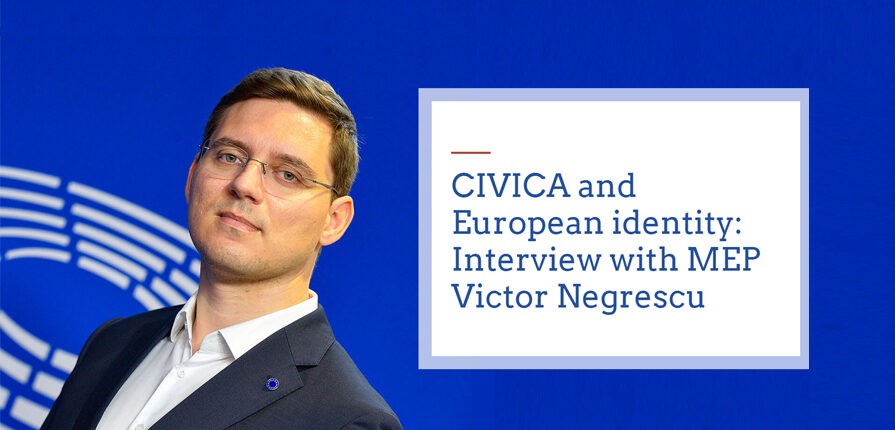European identity is a fundamental concept for the social sciences and one of the most discussed topics at policymaker level as well as citizen level. We aimed to find out what is the current view on European identity at the top of the EU. We talked to Dr. Victor Negrescu, Vice-Chair of the Committee on Culture and Education, European Parliament, and Lecturer and former Vice-Rector at SNSPA, Romania.
The EU is currently facing numerous challenges: the COVID-19 pandemic, the migration crisis, the rise of populism, to name a few. How do you see these challenges reflecting on the trust EU citizens place in European institutions? Do the citizens feel less “European”?
There are a lot of issues that the EU must find solutions to, but COVID-19 constitutes an unprecedented challenge with very severe consequences.
The global pandemic has challenged our health and economy. Still, the coronavirus crisis is also highlighting structural inequalities: from inadequate health systems to social protection gaps, digital divides and unequal access to education, from environmental degradation to discrimination and racism.
While education responses remain nationally focused, the challenges the European education systems have to confront now and over the coming years, such as digitalisation, do not know borders. Education systems across the EU have shown their weak spots during the COVID-19 pandemic.
Education almost came to an impasse, as digital education still is far from being a reality in most Member States! Many countries are still unprepared in the face of the second pandemic wave that is now hitting Europe.
I am glad that the European Parliament has sent a powerful signal in this regard by voting on a resolution initiated by me: it is essential to have a common European response to the challenges faced by education and training systems across the Union. We need to build a European policy in the field while at the same time developing synergies and concrete solutions to the impact of the COVID-19 pandemic. We urgently need to design a common European mechanism that provides the best responses to the current challenges!
The European Union needs to learn from the current crisis and put education at the top of the agenda of the Commission and the Council. We, the European Parliament, call for the allocation of 10% of the European Recovery Plan to education and training to tackle the existing gaps across the Union, upgrade our educational systems and prepare for the shifts in our economy and society. Also, we reiterate the call for the Erasmus+ budget to be tripled, and we encourage the Member States to increase public spending on education significantly.
Every child who is out of school, every person who cannot continue their training, any individual who is disadvantaged by the available opportunities—all these are issues that, if not resolved immediately, will impact on the future of Europe.
Regarding the last part of your question, although there are still many things that need to be settled, I think that the EU is more popular now with the European public than it has been in a long time. According to the European Commission’s Standard Eurobarometer 93, the level of trust in the European Union (43%) is three percentage points higher than trust in national governments (40%) and seven points higher than trust in national parliaments (36%). Also, 51% of EU citizens tend to trust the European Parliament, a level that has not been reached since 2008.
We have to be able to bring the Union closer to the people, because our future lies in a united Europe!
What is, in your opinion, the role universities of social sciences play in Europe today? Can they forge a European identity?
Global issues need the lens of the social sciences, and we have to ensure that the social sciences receive proper recognition in academia and society. In this regard, we created CIVICA – The European University of Social Sciences: to anticipate, understand and respond effectively to current challenges.
For example, epidemics are social as well as biological phenomena. As I already said, the COVID-19 crisis poses unprecedented challenges that call for immediate action. Social scientists can help policymakers to develop solutions such as the effective delivery of mass vaccination programmes.
As for European identity, it is probably one of the most frequently discussed topics in the social sciences. And it is a concept of fundamental importance. Brexit is the most appropriate example of the consequences of a real lack of European identity.
This matter has preoccupied me for a long time. I have initiated and submitted to the European Parliament, together with my colleagues from PES activists Romania, a petition calling for a supranational regulation of European citizenship, which would grant European citizens direct rights, would offer them equal development opportunities and help consolidate a common European identity.
You are actively involved in CIVICA: do you feel its objectives contribute to the consolidation of European identity amongst students, early-stage researchers, staff?
The mission of the universities in the CIVICA alliance is to contribute to the betterment of European society. We aim to give the next generations of Europeans the knowledge and tools to understand and influence an increasingly complex world and also to create a European critical mass to advise policymakers on the challenges faced by societies. Of course, our academic communities will benefit from these activities; they are the heart of this project. CIVICA — The European University of Social Sciences is an Erasmus+ flagship initiative and, in this regard, it is expected that a sense of European identity can be fostered by bringing European students and teachers together.
Interview conducted by Cătălin Mosoia (SNSPA)
Photo credit: European Parliament
This interview was originally published on the website of CIVICA – The European University of Social Sciences



